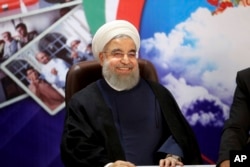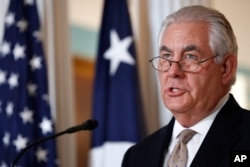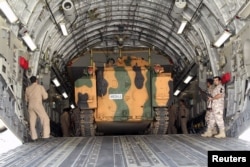A plea by U.S. Secretary of State Rex Tillerson to Gulf states to tone down their rhetoric in a rapidly escalating diplomatic standoff involving Qatar, Saudi Arabia and three Saudi allies appears to be falling on deaf ears.
Bahrain, one of the Saudi allies, has accused Qatar of creating a military escalation in the deepening dispute by letting in more Turkish troops.
And Iran angered the Saudi-allied group by saying that a Saudi-led blockade of Qatar is "unacceptable." Tehran pledged to keep Iranian air space and sea routes open for Qatar to weather the blockade imposed on the tiny emirate by Saudi Arabia, Bahrain, the United Arab Emirates and Egypt.
In a phone call late Sunday with the Qatari emir, Iranian President Hassan Rouhani told him, "Tehran will stand by Qatar's government," according to a statement released by Iran's Foreign Ministry. "Iran's air space, ground and sea will always be open to Qatar as a ... friendly nation," said Rouhani, adding the cooperation between the two countries will remain "continuous."
The Saudis and their allies have demanded Qatar scale back ties with Iran.
Terror funding charges
Saudi Arabia, the United Arab Emirates, Egypt and Bahrain accuse Qatar of funding terrorism and fomenting regional instability; but only two of the demands in a list of 13 made public last week focus on funding of jihadist or militant groups. Other demands include Doha shuttering its international broadcaster, Al-Jazeera, whose Arab-language broadcasts especially have long angered the Saudis and other dynastic Gulf leaders. They see Al-Jazeera as an arm of Qatari foreign policy, fomenting dissent.
They also want the emirate to sever ties with the Muslim Brotherhood, a transnational Sunni Islamist movement accused by some countries of being a terrorist organization. The Muslim Brotherhood denies it supports violence and several affiliates have participated in democratic politics.
Qatari officials say the Saudis, who have also been accused of funding Islamic militants, want to force Doha to realign its foreign policy with Riyadh.
But Sunday, Tillerson said it would be very difficult for Qatar to meet some of the Saudi demands. He urged all parties to negotiate an end to the Persian Gulf standoff, the worst diplomatic crisis among Gulf allies in decades.
The Saudis have given Qatar until July 3 to comply with its demand, but Qatar has rejected the demands as unreasonable, saying they impinge on the emirate's sovereignty. Tillerson said "there are significant areas which provide a basis for ongoing dialogue leading to resolution."
Disagreement deepens
The mood Monday appeared to darken with an increase in the rhetoric. Bahrain's foreign minister lashed out at Qatar and — without directly naming it — Turkey, whose president has close ties with the Muslim Brotherhood. About 100 Turkish troops with armored vehicles have arrived in Doha since the crisis erupted, along with cargo planes loaded with supplies, and Turkey appears set to send another 900 soldiers.
"The foundation of the dispute with Qatar is diplomatic and security-oriented, never military," Bahrain's foreign minister, Sheikh Khalid bin Ahmed al-Khalifa, said on Twitter. "Bringing in foreign armies and their armored vehicles is the military escalation that Qatar has created," he added.
In a show of support, Turkey rushed through legislation to send more troops to Qatar days after the blockade was imposed on Qatar three weeks ago. On Sunday, Turkey's president, Recep Tayyip Erdogan, dismissed the Saudi-led demands as unlawful interference in Qatar's domestic affairs.
"To ask Turkey to pull its troops from Qatar is, firstly, disrespectful behavior toward us," he said in Istanbul. "We don't need permission from anyone to establish military bases among partners."
According to Qatar's economy minister, Nihat Zeybekci, Turkey has sent more than 120 cargo planes of supplies to the emirate.
"These moves should not be seen as being directed against anyone," he said, adding that Turkey was just working to meet the daily needs of the Qatari people. "We hope these problems will be resolved soon."
The standoff in the Gulf has exposed rifts in the administration of U.S. President Donald Trump. Some analysts argue that mixed messages coming out of Washington risk prolonging the crisis. Trump tweeted his support of the Saudis, but the State and Defense departments have been more cautious, and Defense Secretary Jim Mattis assured Doha of continuing support.







